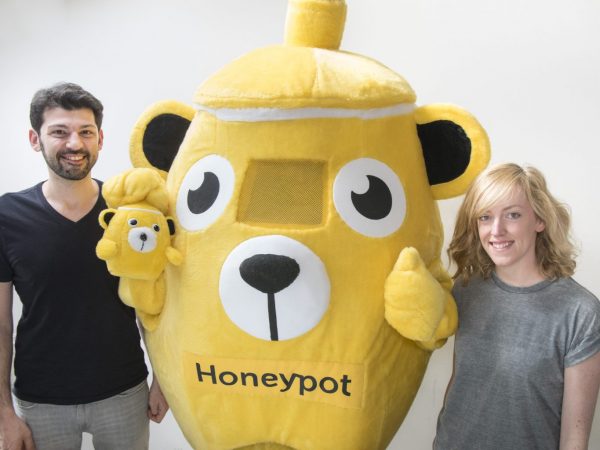Don’t be fooled by their cutesy graphic design. This job platform means business, and in just a few years, has flipped the script on traditional steps of recruiting.
When a Colombian software developer decided he wanted to live abroad, he turned to a newfangled job platform called Honeypot, a Berlin startup that’s turning tech-recruiting on its head by asking companies to apply to candidates. We take a look into the process with the company’s co-founder, to find out what it’s all about.
“Living abroad, learning new languages, getting to know new cultures – these are all things I had imagined for my life,” says Andres Visbal, recalling what first led him to Honeypot. “So I started looking for a job abroad, but it was surprisingly frustrating.”
Andres is a backend software developer with eight years’ experience in an industry projected to grow by 24 percent by 2026. His skills are in high demand, so it wasn’t so much a lack of offers, it just seemed like the companies were clueless.

“Most ads I saw seemed like amalgams of Google searches for the term ‘software developer skills’,” he says. “I would see lists of requirements impossible for anyone to live up to, and sometimes I would even start the interview process only to realize the company had completely different needs from the description. Finally, a recruiter recommended Honeypot.”
Andres liked the “companies apply to candidates” model of matching developers with work they love across the EU, and so he thought, “Why not?”
“A few clicks later I had a profile,” he says. “I just imported my LinkedIn info and tweaked a few minor things. Once I was finished, the platform surfaced me to the first batch of a dozen or so companies, so I could begin interviewing with the ones I liked. The process was staggered, so I was never inundated with emails, but I still had consistent interest, and I had a talent representative from Honeypot assigned to my case, to advocate for me through the process, like if a company didn’t respond. Later, they even helped me and my partner obtain the right visas. And all the inquiries I received were actually relevant to my skills.”
Andreas moved to Hamburg at the end of June of this year to start his dream job with Xing, a German language competitor of LinkedIn, and he’s just one of 36,000 success stories. So how does this whole thing really work, and why do so many companies already have their paws in the Honeypot?
For this, we spoke to Honeypot co-founder Emma Tracey, who took home the title of Recruiting Startup of the Year at the Hiring Success Conference in San Francisco last March, and who’ll return as a judge in the RSOTY competition at Hiring Success Europe, September 19-20th, in Berlin.
What was the hardest moment for Honeypot in the midst of this rapid growth?
There are hard moments for every founding team, anyone who is taking on a startup should be prepared for that. For us, we thought our platform would be much, much more automated than it turned out to be. Our algorithm does all the matching, don’t get me wrong, but we still needed a human element. Honeypot experienced rapid growth once we doubled down on support for the candidates. You can’t deny that people need help with big decisions, and we can provide that expertise and guidance via our talent reps.
What was the most transformational moment for Honeypot?
It may sound basic, but for me, it was when we started to do in-depth user-interviews, and take them seriously when considering product development. It’s something so obvious, right? Of course you should talk to the people navigating your solution, yet it’s so easily overlooked. It hit me when I was having a casual conversation with one of our users at an event, I was like “Wow, why aren’t we doing this all the time? Let’s institutionalize this kind of feedback.”
What stands out about your company culture?
When I think of our team, three words come to mind: curious, caring, and smart. Everyone on our team wants to experiment and learn, we care about the people who use our product and we want to make it great for them. We’re constantly learning and evolving.
In honing our work culture, “Sprints” is a Google Ventures concept that has worked really well for us. We decide on a new feature we want to roll out, and work together to design a prototype in under a week. The results have been great. We’ve experienced a huge amount of buy-in from all departments, so we are now implementing this methodology into our operations and strategy.
Of course, there’s fun stuff that’s just kind of sprung up as we go, like our conference table is actually a ping-pong table, there’s a book exchange in the break room, and – my personal favorite – the office dogs!

You are on the front lines of tech recruitment, seeing demand grow. What’s the answer to the talent shortage in the tech sector?
I definitely don’t think that you need to go to university to be a developer. These degrees are great for learning the foundations of software, which is important for a certain type of developer, but there are many, many types of developers. I think that’s what people forget when they are building a modern technology company. A broad range of skills is extremely important to have within your software development team, so I see the rise of coding boot camps and other shorter programs as a big positive.
To me, the future of training tech talent is a combination of modernizing computer science degrees, and probably opening up more vocational training, like one- to two-year courses that focus more on practical software development than the tenants of computer science. We offer coding classes for all employees, as well as tuition benefits to encourage anyone who’s interested to learn more about programming. After all, it’s our business and we want our team to be literate.
Why is your platform good for companies?
We help businesses to understand better what they need. Not everyone is a tech person, but most companies need tech people, so we give recruiters extensive training on programming languages. That way there’s a basis of understanding of how all this technology works together, and what exactly their needs are. We empower both sides of hiring to find what they need. Companies get vetted candidates that are actively looking for a job, and developers only receive offers that are relevant to their skills and interest.











